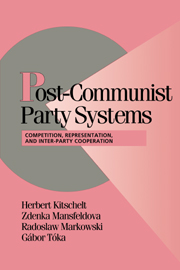Book contents
- Frontmatter
- Contents
- List of Figures and Tables
- Acknowledgments
- Introduction: Democracy and Party Competition
- Part I Theory: Party Systems and the Procedural Quality of Post-Communist Democracy
- 1 Historical Legacies and Strategies of Democratization: Pathways toward Post-Communist Polities
- 2 The Quality of Post-Communist Democracy: Patterns of Party Competition, Representation, and Inter-Party Collaboration
- Part II Setting and Research Strategy
- Part III The Structuring of Party Competition
- Part IV Political Alignments and Dimensions of Competition
- Part V Political Representation and the Quality of Democratic Governance
- Conclusion
- Appendix I List of Political Parties and Electoral Alliances
- Appendix II Questionnaire for the Elite Study
- Appendix III Population Survey Questions (Policy Opinions)
- Bibliography
- Index
- More Titles in the series
1 - Historical Legacies and Strategies of Democratization: Pathways toward Post-Communist Polities
Published online by Cambridge University Press: 05 June 2012
- Frontmatter
- Contents
- List of Figures and Tables
- Acknowledgments
- Introduction: Democracy and Party Competition
- Part I Theory: Party Systems and the Procedural Quality of Post-Communist Democracy
- 1 Historical Legacies and Strategies of Democratization: Pathways toward Post-Communist Polities
- 2 The Quality of Post-Communist Democracy: Patterns of Party Competition, Representation, and Inter-Party Collaboration
- Part II Setting and Research Strategy
- Part III The Structuring of Party Competition
- Part IV Political Alignments and Dimensions of Competition
- Part V Political Representation and the Quality of Democratic Governance
- Conclusion
- Appendix I List of Political Parties and Electoral Alliances
- Appendix II Questionnaire for the Elite Study
- Appendix III Population Survey Questions (Policy Opinions)
- Bibliography
- Index
- More Titles in the series
Summary
The breakdown of political and economic regimes always offers new political actors opportunities to deal creatively with a highly contingent and open range of possibilities in order to craft new institutions and power relations. Nevertheless, the creativity of actors is also constrained by the experiences of the past and the patterns of economic and political resource distribution under the old regimes. Whereas historians are typically fascinated by the openness of choice in situations of regime breakdown and the idiosyncrasies of the actors who take advantage of them, sociologists and political scientists tend to focus more on the regularities and continuities that exercise a persistent influence on the pathways of social and political transformation in crisis situations, mediated by actors' rational pursuit of power, wealth, or ultimate cultural values. In this vein, the profound diversity of post-communist polities may not predominantly result from random variation of actors' choices when faced with the collapse of the existing communist political and economic regimes. Although regime breakdown may make some actors imagine an almost infinite range of choices among alternative new social and political orders, the former institutions and resource distributions, together with entrenched mutual expectations about likely or appropriate behavior generated under the old regime, still affect actors' aspirations and practical moves when building a new order and thus circumscribe the feasible set of outcomes.
Both historical legacies and actors' strategic choices matter in the pathdependent process of creating new polities and economies.
- Type
- Chapter
- Information
- Post-Communist Party SystemsCompetition, Representation, and Inter-Party Cooperation, pp. 19 - 42Publisher: Cambridge University PressPrint publication year: 1999
- 2
- Cited by



